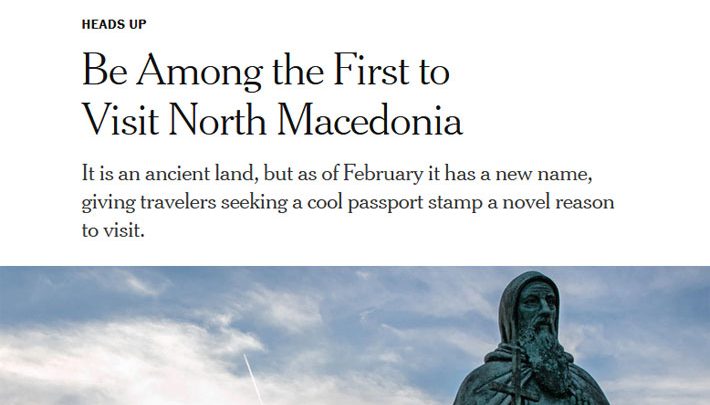The world has a newly named country, North Macedonia. And that is good news for regional relations and travelers, who are visiting the southeastern corner of Europe in growing numbers, read a New York Times article titled “Be among the first to visit North Macedonia”.
In February, “the former Yugoslav Republic of Macedonia” — as the United Nations referred to the Balkan country during its admittance in 1993 — officially became the Republic of North Macedonia. For travelers, the newspaper writes, the end of the dispute means a new passport stamp and a novel reason to discover this nascent, yet ancient land, which is about the size of New Hampshire and borders Greece, Bulgaria, Serbia, Kosovo and Albania. Dense with old-world culture, rustic gourmet cuisine, mountain chains, remote villages, and some of the oldest and deepest lakes in Europe, the country is a synapse connecting traditions on the crossroads between empires — Greek, Macedonian, Roman, Byzantine, Ottoman —where the Occident and Orient have long found middle ground.
“What the agreement does, in my opinion, is take away our philosophical boundaries,” said Aleksandar Donev, Macedonia’s former director of the Agency for Promotion and Support of Tourism. “It takes away the word ‘former’ from our name, and stops defining us as something we were in the past. It sets us free to be present with a much clearer and positive vision for our future.”
“Our physical strengths and the cultural experiences that we’ve been perfecting for centuries — like our food, wine and traditions — have never been in question,” he said.
New York Times, among other things, conveys the assessment of deputy prime minister Kocho Angjushev, who said the country is already seeing an uptick in favorable publicity, which he believes increases its economic potential.
Arguably, this positive surge is coming at the right time for the nation — just before tourism high season, which traditionally extends from late spring into the autumn. The timing also dovetails well for travelers to discover the Balkan region, one of the continent’s burgeoning cultural and adventure destinations, New York Time writes.





Comments are closed for this post.